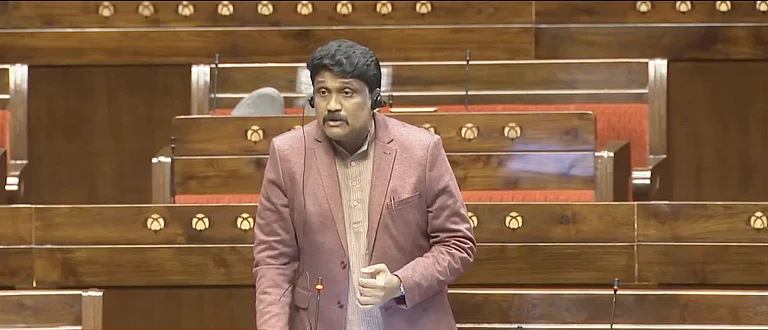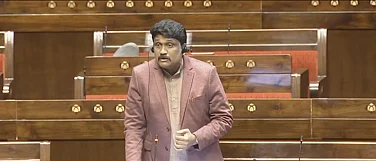THESE are the spies who came in from the cold. And were then left cold. The foot-soldiers of the Indian State as it played out its 1970s version of the Great Game, today undesired byproducts of the murky melting-pot that is subcontinental espionage. A far cry from the fieldmen immortalised by Le Carre and certainly no latter-day descendants of Kim. In many ways, the perfect spiesunless the Indian intelligence and security apparatus acknowledges their existence, they do not exist. Not that these men are not used to betrayal; the presiding deities for the better part of their lives have been duplicity and intrigue. But what years spent in Pakistani jails could not do, the treatment meted out to them in their mother country has accomplished. This, happened to the believers.
There are six of them. Kabul Singh, Balbir Singh, Balwinder Singh, Mohinder Singh, Fakiria Masih and Balwinder (driver) Singh. All recruited in the catchment areathe Punjab hinterland bordering Pakistanfor the Intelligence Bureau (IB), Military Intelligence (MI) and the G Branch (the BSF intelligence unit) in the early 70s. All irreverent young men, mainly Sikhs, with a dash of daring, a lack of higher education, no permanent jobs to hold them down and in need of money. Trained, paid, provided with new identities and released into Pakistan.
Where they gathered intelligence, made drops, ran agents, et al, crossing the border into Pakistan as many as five times in a month for varying periods of stay. For more than a few years, well beyond the safe operative lifespan of a spy. Till they were arrested, tried by military courts and sentenced to between seven and 15 years in Pakistani jails for spying. Released from jail in 1986 as part of their prison terms, all six of them made it back home. Only to find their former masters refusing to even acknowledge them. And the Khalistani separatists baying for the blood of the "Indian agents".
But it wasnt like that when it began. Kabul Singh had cleared his Class 10 exam a couple of years ago and was a zone-level football player when, he says, an IB sub-inspector befriended him over a period of a few months in 1972 and told him about the "service he could do his country".
Recounts Kabul Singh: "The money was decent and I was told that I would get a regular salary and be absorbed into the service after a while. And it was for the country. In November, that year, I was summoned to Amritsar and interviewed by a DSP. Then I was trained for a couple of months in Islamic culture, the Koran, the dialect of Punjabi I should speak and minute details that would help me pass off as a Muslim on the other side such as remembering never to sleep with my feet pointing West or relieve myself facing that way because Mecca is in that direction. There were a million other instructions, and, of course, my hair and beard had to come off. I made a couple of brief forays into Pakistan each month to gather low-level intelligence like newspapers, telephone directories of cantonment areas and keep an eye open for troop movements. I realise now that most of us were chosen because living in the border areas, we shared a common language and many customs with the Pakistanis on the other side.
r "Towards the end of 1973, my intelligence inputs were medium-level and I was taken to Ajnala for a one-month course in topography, map-reading and sketching. In the next few years I pulled off some major coups, including stealing a top secret file from the Wah Armaments factory which contained the specifications of all the weapons in the production line and drew sketches of the entire complex with the help of a Pakistani Army clerk who was on our payroll, crossing the border back into India to show it to my superiors, and blackmailing the clerk into replacing it after a day," recalls Kabul, with all the pride of a fieldman who knows that this was a big one. He was arrested near Peshawar with some documents he was getting back to India in December 1975, and sentenced to 14 years in prison for spying.
Balbir Singhs first foray into the world of intrigue was similar. Having travelled to Amritsar from his native Gurdaspur village in 1970 looking for a job, he found work in a textile factory. Says Balbir: "Towards the end of the year, an IB assistant sub-inspector had struck up a friendship with me and told me what spying for the country would mean. I was interested and we both went to meet the DSP who at first did not seem very keen on taking me on. But in February 71 I was on and spent the next two months in training. Apart from having my hair cut, I was also circumcised to fit in better in Pakistan. For the next year I got details of army movements, bridges, lines of defence and a lot of other information which I was told was very helpful for the army during the 71 war.
"A few months after the war, I started visiting Pakistan again, sometimes staying for weeks, at other times even a month or more, at a time. By 1973 there was a new DSP in-charge, and I reminded my superiors that they had promised me a regular job after a couple of years. I was told that it was in the pipeline but that the MI needed some experienced people and was sent to meet an army JCO and major at Jalandhar where I was briefed on the kind of intelligence the army was interested in. I worked for them for about a year till I was arrested on June 19, 1974 when I was double-crossed by a Pakistani JCO with the 2 Commando battalion posted at Jamrud Qila. The military court pronounced a 10-year jail term for me," he says.
Balwinder Singh, codename Doctor, Mohinder Singh, Fakiria Masih and Bal-winder (driver) Singh alias "source number 40, BSF G branch", have similar tales to tell. And when they all returned to India in 1986, having literally been pushed into the country in the Ganganagar sector, after having served time in Pakistani jails, they thought it was the end of their travails. But for all six men, the next decade was even more nightmarish with no help at hand and their former employers refusing to even acknowledge their existence.
And that is what seems to irk them the most. Their common refrain is that "we knew the consequences of our actions". "We are not complaining about the fact that we were jailed in Pakistan, though the Indian Government could surely have tried to get us out earlier; but then I guess we were always only ever the small fish, never mind the fact that we did all the work. There is, moreover, no justification for them not even recognising us after we got back," says a bitter Mohinder Singh.
But old spies dont just fade away. The first few years after their return were spent trying to rebuild their lives and exorcising memories of jail and interrogation, apart from pestering their former employers to help them out. Then these attempts became few and far in between as the need to survive gained primacy over the desire for acceptance. "We realised that we were the plebians of the world of espionage; nobody was interested in what we did, how we did it and whom we did it for. That we had risked our lives each day for a country which did not care," says Balwinder Singh, who has been living at his sisters house in the village of Goansabad near Amritsar with his wife and two children for the past six years, as he cannot afford a place of his own. Employed as a driver with a local concern, Balwinder says his salary is just enough to feed and clothe his wife and two young children.
In fact, apart from Kabul Singh and ists, Fakiria Masih, the others got married after to they came back to India when they were well into their 40s. "Our children are still very young and we do not know what will happen to them once our bodies and minds pack up, which is likely to happen sooner rather then later after the kind of abuse we have been through," he adds. Mohinders mother has a slightly different lament: "For 10 years I prayed and wrote to our government to get our son back. Now that he is here, no thanks to the government, I spend my time praying for a grandchild. But my handsome son is old before his time," she wails.
Kabul Singhs only child, a daughter, was born two months after he was arrested and the first time he laid eyes on her was in 1986 after his release from prison when she was a gawky 10-year-old. "Now shes getting married. I feel I never really knew my daughter," he says. Fakiria, who was a guide for agents to be sent into and brought out of Pakistan from 1969 to 1976 when he was arrested at Rawalpindi, feels the same way about his six children who were young men and women by the time he returned to India.
It is left to Kabul Singh, the only one among the six to have used his skills in helping the security forces after 1986, ("to make some important seizures and in capturing extremists, mainly for the reward money") to say it like it is: "Only after militancy was curbed and the judiciary started intervening on behalf of the people that five of us (excluding 'Driver' Singh who plans on moving the courts within the fortnight) decided that a decade was long enough to wait for some sort of recognition and compensation. So we moved the Punjab and Haryana High Court in July this year. And eureka! Suddenly I am approached by intelligence agencies, asked to accept a sum of money and drop the case. But if one or two of us accept, it will harm the chances of the others. We have been humiliated enough and I do not intend to rest till we get our due, with honour, from the Government," says Kabul Singh.
Their lawyer, Ranjan Lakhanpal, says that the high court bench hearing the case had, in August, passed an order on the petitions by giving notice to a Senior Standing Counsel for the Union of India asking him to forward these petitions to the Home Secretary and directing the Government to take a decision on the "controversy raised in the petitions" within the next three months. "Three months are nearly over and we are still waiting," says Lakhanpal.
Whatever the result of the legal battle may be, if what these six men assert is true, it can mean only one thing: that the nation-state is being undermined by its very protectors.


























